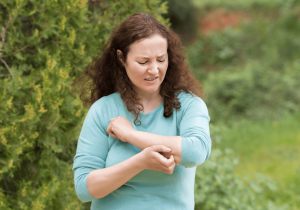
Staying mindful of West Nile virus
Most of the time, mosquitoes are just pesky pests that spoil your day or your cookout. Unfortunately, mosquitoes are not just a hassle or a headache; they can actually place your health and life at risk. See, being bitten by certain mosquitoes can transmit life-threatening viruses like West Nile virus, malaria, and dengue. Bites from these infected bugs can leave you with more severe symptoms than a simple itchy, red bump. This is why it’s important to be aware of the threat posed by West Nile virus and the serious health risks that bites from infected mosquitoes can carry. Discover a bit about these bites and the prevalence of the problem, the factors that can raise your risk for West Nile virus, and the signs that you may have been bitten by an infected insect. Then, learn about the most effective treatments to stop West Nile virus from bugging you for long.
Uncover the biting truth
In recent years, people have become much more concerned about various viruses in the air. While most are spread through a cough, a sneeze, or a handshake, another virus is mainly spread by a menacing mosquito. Mosquitoes may be tiny bugs, but their bites can pose a serious threat to your health if they are infected with West Nile virus. The virus gets its name from the West Nile district of Uganda in Eastern Africa where the virus was first identified before spreading throughout the world through the bite of infected mosquitoes.
The spread of the West Nile virus
Today, West Nile virus is the leading cause of mosquito-borne illness in the United States. It’s thought that around 2,000 Americans get infected with West Nile virus each year, yet this figure is approximate because most people do not experience any symptoms, or they attribute any signs to another cause. Since the virus is most commonly spread by mosquitoes, the chance of contracting West Nile virus rises during mosquito season, which begins in the summer and continues through the fall. Very rarely, West Nile virus can spread from person to person, such as through a blood transfusion, an organ transplant, pregnancy, or breastfeeding.
Scratch out the risk factors
Anyone who lives in or travels to a location around the world where West Nile virus is present can contract the virus at any time, but the risk of getting infected increases during certain times of the year and at certain times of life. The biggest factors that make you more susceptible to developing symptoms of West Nile virus—which can range from mild to severe—include:
- Age, with the risk rising over age 60
- Underlying health conditions, such as cancer, high blood pressure, diabetes or kidney disease
- Organ transplant recipient
- A compromised immune system
A plague of symptoms
For most people, mosquito bites are merely mildly itchy and irritating. But for others who get bitten by mosquitoes infected with West Nile virus, the virus can cause uncomfortable symptoms and potentially lead to a very serious illness. Most people infected with West Nile virus do not develop any symptoms at all, while about 20% have a mild case and develop flu-like symptoms that eventually subside but may leave a lingering sense of weakness or fatigue that can last for weeks or months. A very small percentage of people will experience life-threatening symptoms if the virus spreads to their brain. If you experience any of the following symptoms, consult with your SignatureMD-affiliated doctor to consider ordering tests for West Nile virus. The most common symptoms include:
- Fever
- Severe headaches
- Fatigue and weakness
- Body aches
- Joint pain
- Nausea
- Vomiting
- Diarrhea
- Severe rash
- Confusion
- Tremors
Treatments to take the bite out of West Nile virus
If you are itching for relief from the sting of West Nile virus, you’re not alone because there are no specific cures or vaccines available for the virus. For mild cases, simply getting enough rest, drinking plenty of fluids, and taking over-the-counter medications will help ease many symptoms. People with severe symptoms from West Nile virus may have to be hospitalized for more intensive treatment.
With mosquito season in the air, try to keep West Nile virus from getting under your skin, and contact your SignatureMD-affiliated doctor right away if you suspect West Nile virus.